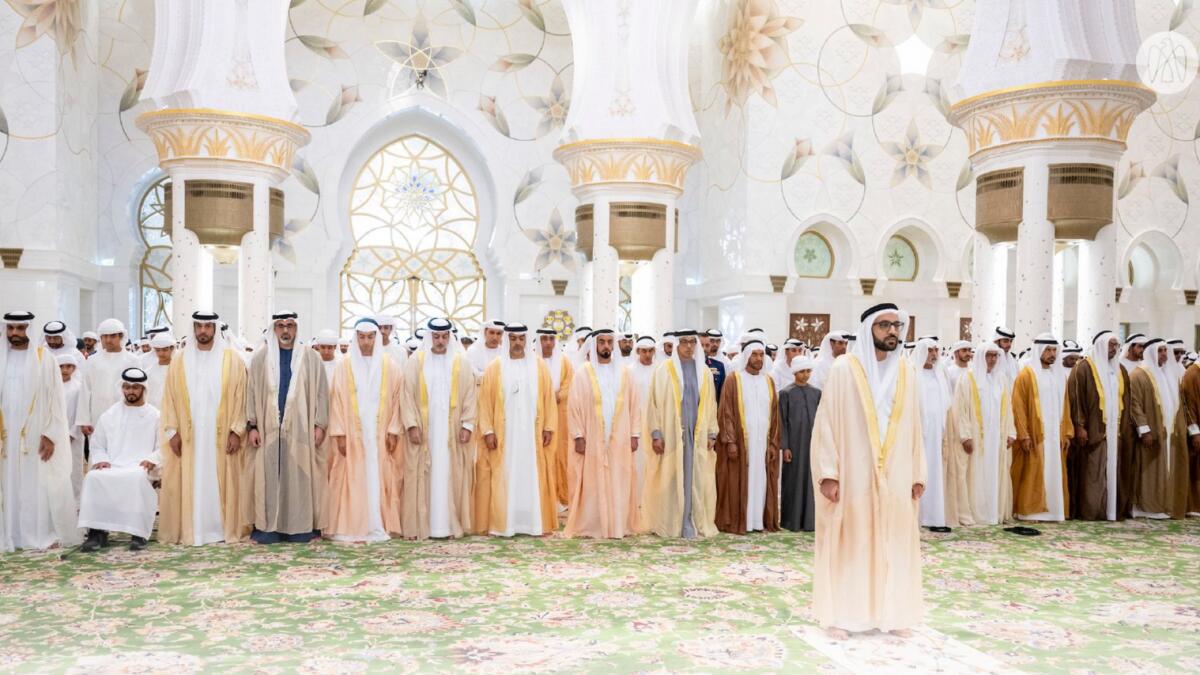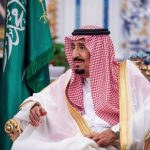The leaders of the UAE performed Eid Al Adha prayers on Sunday, June 16, as Muslims across the country celebrated the highly revered religious festival. Eid Al Adha, also known as Feast of Sacrifice, is the holiest of the two Eids celebrated by Muslims worldwide. The day includes offering special prayers and slaughtering livestock such as goat, cow, sheep, or camel. President Sheikh Mohamed bin Zayed greeted leaders, citizens, and residents of the country.
Sheikh Mansour bin Zayed Al Nahyan, Vice-President, and Deputy Prime Minister performed the Eid Al Adha prayer at Sheikh Zayed Grand Mosque in Abu Dhabi. Sheikh Hamdan bin Mohammed bin Rashid Al Maktoum, Crown Prince of Dubai also participated in the prayers alongside Sheikh Maktoum bin Mohammed bin Rashid Al Maktoum, First Deputy Ruler of Dubai. Dr. Sheikh Sultan bin Muhammad Al Qasimi, Ruler of Sharjah, performed the Eid Al-Adha prayer at the Sharjah Mosque.
Sheikh Humaid bin Rashid Al Nuaimi, Supreme Council Member and Ruler of Ajman, performed the Eid Al-Adha prayer at the Sheikh Rashid bin Humaid Mosque in Ajman, along with Sheikh Ammar bin Humaid Al Nuaimi, Crown Prince of Ajman. Sheikh Hamad bin Mohammed Al Sharqi, Ruler of Fujairah, led the prayers at Sheikh Zayed Grand Mosque in Fujairah. Sheikh Saud bin Rashid Al Mu’alla, Ruler of Umm Al Qaiwain offered prayers at the Ahmed bin Rashid Al Mualla Mosque.
The leaders took to social media to extend their Eid greetings to the citizens and residents of the UAE, wishing everyone a blessed Eid Al Adha. The leaders emphasized the importance of harmony, peace, and unity during this auspicious occasion. Muslims all over the world come together to celebrate Eid Al Adha, marking the end of the annual Hajj pilgrimage. The prayers and festivities on this day symbolize sacrifice, charity, and unity within the community.
Eid Al Adha is a time for reflection, gratitude, and celebration of faith. The prayers and rituals performed during this festival signify the importance of sacrificing material possessions for the greater good. The UAE leaders set an example by participating in the Eid prayers, showing unity and solidarity with their people. The message of peace and harmony resonates throughout the country during this festive season.
The significance of Eid Al Adha goes beyond religious boundaries, as it promotes the values of compassion, generosity, and selflessness. Muslims commemorate the willingness of Prophet Ibrahim to sacrifice his son as an act of obedience to God. The slaughtering of animals and distribution of meat to the less fortunate highlight the spirit of charity and sharing during Eid Al Adha.
The UAE leaders’ participation in the Eid prayers showcases their commitment to the nation and its people. Their presence at the mosques on this auspicious day reflects their dedication to upholding tradition and values. By joining citizens and residents in the prayers, the leaders demonstrate a sense of inclusivity and unity, fostering a strong sense of community among the people.
In conclusion, Eid Al Adha is a time of joy, reflection, and unity for Muslims around the world. The UAE leaders’ participation in the Eid prayers and festivities symbolizes their commitment to fostering peace, harmony, and solidarity within the country. As citizens and residents come together to celebrate this important religious festival, the message of sacrifice, charity, and unity resonates throughout the UAE, creating a sense of togetherness and shared values among the people.











